Uncategorized
8 Reasons a Strategic Crypto Reserve Is a Bad Idea

One might think that virtually all Bitcoiners would be thrilled about the notion of the U.S. government acquiring BTC (and perhaps a basket of other cryptoassets) and effectively ratifying it as a global asset of consequence. However, I count myself among the few holdouts who don’t see the development as positive for either Bitcoin or the U.S. government itself. Here’s eight reasons why I don’t support the policy.
What is easily done is easily undone
If Bitcoiners want a reserve to last, they should want Trump to seek Congressional authorization for a purchase (as is customary for any large outlay). If it is done solely by executive fiat, the next administration will not feel bound by the policy and could trivially reverse it (and nuke the market in the process). If Bitcoiners sincerely believe it benefits the U.S. to acquire bitcoin and hold it for a long period of time, then they would have no issue insisting that the government pass a law authorizing spending for the Reserve, rather than having Trump enact the policy unilaterally.
The fact that many Bitcoiners are hoping that Trump makes the policy without asking Congress for approval shows that they are chasing a short-term pump, rather than actually being sincere about the long-term value of the Reserve for the U.S. A future Democratic administration will have no qualms about immediately divesting the Reserve.
The global reserve issuer should not disrupt itself
The U.S. is the issuer of the global reserve currency. We still don’t know how the Crypto Reserve will be positioned – as simply an investment fund, or something more inherent to the dollar such as a new commodity-based currency system like the old gold standard.
If the Crypto Reserve is contemplated as providing a new backing for the dollar, I believe this will cause significant unease in dollar and Treasury markets. Effectively, the government will be signaling that it believes it no longer has faith in the dollar system as it currently exists, and a radical change is needed. I imagine that this would cause already-high rates to rise, as the market starts to wonder whether the U.S. is contemplating a default on its debt. The government should be focused on shoring up investors’ faith in its ability to sustain its debt obligations by pursuing pro-growth and deficit-reducing policies, not toying with the entire structure of the dollar system.
Many Bitcoiners don’t buy this line of reasoning and simply want to accelerate the collapse of the dollar. I view this as a kind of financial terrorism. I don’t believe in financial accelerationism nor do I think bitcoin – or any other cryptoasset – is ready to serve as the backing of a new commodity standard for the dollar.
The U.S. already has plenty of exposure to Bitcoin
American funds and individuals hold more Bitcoin than the citizens of any other country on the planet – almost certainly by a large margin. The U.S. government already benefits from this state of affairs. When Bitcoin goes up, those Americans who realize their gains owe taxes to the government – either 20% or 40% of their gains based on how long they have held the position.
This is a meaningful point not to be overlooked. The U.S. already benefits when Bitcoin goes up, through tax realizations – more than any other country. In light of this, do we really need to pick a massive fight and insist that the U.S. government gain direct exposure for these assets, too? No one is pushing for the U.S. government to acquire Apple or NVIDIA stock. Why Bitcoin?
There is no “strategic” value in a crypto reserve
Generally, assets and commodities that the U.S. acquires at the government level are things that might be required in a pinch, and have to be accumulated ahead of time. The Petroleum Reserve is a good example, as oil is clearly an essential commodity, and in a crisis, we might not be able to acquire all the oil that we need.
We also maintain reserves of other sorts of strategic assets, such as medical supplies and equipment, rare earth minerals, helium, metals like uranium and tungsten, and agricultural commodities. These all have a clear and obvious purpose: creating a reserve that can be dipped into in a time of emergency.
We also stockpile foreign FX, in case we need to make interventions into currency markets, although these interventions are increasingly rare. There is no obvious strategic use for bitcoin (and certainly not Cardano or Ripple). Ordinary Americans do not need a “supply” of bitcoin or any other cryptoasset to support their quality of life. This might change if the entire financial system runs on a blockchain and we need the tokens for gas (the one analogous «industrial” use I could think of), but that’s not the state-of-play today. The only “strategic” use for bitcoin is simply going “long” the asset at the state level and selling it later, but you could accomplish this with any other financial asset. There’s nothing unique about bitcoin (or any other cryptoasset) in this regard.
Of course, if you’re going to ultimately back the dollar with bitcoin in some kind of neo gold standard, then it would have a strategic use (in which case you should refer back to point #2). But I don’t think that is the intent right now.
A Crypto Reserve dilutes the value proposition of Bitcoin
Mixing Bitcoin in with rival cryptoassets Ethereum, Cardano, Solana, and XRP and giving them all an equal government imprimatur devalues Bitcoin and makes it look undifferentiated from these assets. Bitcoin is the only one of the bunch with a credible supply schedule and genuine decentralization at the protocol level. A crypto reserve confuses the issue and devalues Bitcoin in the public eye. Principled Bitcoiners should push for an all-or-nothing approach; either just Bitcoin, or no reserve.
Bitcoin does not need the government
I wonder what early libertarian Bitcoiners from 2012-16 would think of 2025 Bitcoiners pushing for the government to backstop the value of their coins. Beyond the confusing ideological evolution that the Bitcoin community has undergone, another point remains. Bitcoin has been one of the best performing investments in history, monetizing from nothing in 2009/10 to trillions of dollars in aggregate value in 2025. It has done all of this without government support, and, indeed, in many cases, despite overt hostility from powerful nation-states. A Crypto Reserve would transform bitcoin from an apolitical asset into the plaything of the government, subject to Washington’s political cycles. Bitcoiners were never ones to hitch their wagon to the government, and they shouldn’t start now.
It would turn Americans against Bitcoiners
Only a fraction (somewhere between 5-20%) of Americans own bitcoin, and even fewer own other cryptoassets. Many Bitcoiners are extremely wealthy due to their historical investments in the coin and others. At a time when government spending is under the microscope, using taxpayer dollars – regardless of how mechanically they are apportioned – to bolster the price of Bitcoin and other cryptoassets will be politically unpopular. Biden’s proposed student loan amnesty was met with great resistance, despite potentially applying to 43 million borrowers. Bitcoiners are a smaller bunch and even less in need of financial support from the government. This policy would undoubtedly cause an unnecessary backlash in broader society against the crypto community.
It looks self-interested
It’s no secret that Trump and his cabinet and inner circle have ownership in various cryptoassets. Trump himself has launched, or is affiliated with: an NFT project built on ETH, more than one memecoin built on Solana, and, of course, World Liberty Financial which holds an array of crypto assets. What we need from Trump is reasonable crypto policy, and based on his appointments at Treasury, Commerce, SEC, CFTC, OCC and others, it looks like he is delivering that.
However, using government resources to directly increase the value of coins that Trump (and many in his inner circle) hold leaves a sour taste. Most of us in the crypto industry have simply been asking for reasonable policy and fair rules of the road so that we can do business in the U.S. Trump is proposing going much further than this and using taxpayer dollars to speculate on the coins themselves, potentially enriching himself and his associates.
To Trump’s critics, this appears corrupt. It also makes the remainder of Trump’s pro-crypto policymaking and regulatory efforts look self-interested, rather than letting it stand on its own as good policy. A future administration could choose to throw the baby out with the bathwater, reversing all the progress the U.S. has made on crypto. The existence of the Reserve gives future regressive efforts an easy moral justification.
Uncategorized
AI, Mining News: GPU Gold Rush: Why Bitcoin Miners Are Powering AI’s Expansion

When Core Scientific signed a $3.5 billion deal to host artificial intelligence (AI) data centers earlier this year, it wasn’t chasing the next crypto token — it was chasing a steadier paycheck. Once known for its vast fleets of bitcoin mining rigs, the company is now part of a growing trend: converting energy-intensive mining operations into high-performance AI facilities.
Bitcoin miners like Core, Hut 8 (HUT) and TeraWulf (WULF) are swapping ASIC machines — the dedicated bitcoin mining computer — for GPU clusters, driven by the lure of AI’s explosive growth and the harsh economics of crypto mining.
Power play
It’s no secret that bitcoin mining requires an extensive amount of energy, which is the biggest cost of minting a new digital asset.
Back in the 2021 bull run, when the Bitcoin network’s hashrate and difficulty were low, miners were making out like bandits with margins as much as 90%. Then came the brutal crypto winter and the halving event, which slashed the mining reward in half. In 2025, with surging hashrate and energy prices, miners are now struggling to survive with razor-thin margins.
However, the need for power—the biggest input cost—became a blessing in disguise for these miners, who needed a different strategy to diversify their revenue sources.
Due to rising competition for mining, the miners continued to procure more machines to stay afloat, and with it came the need for more megawatts of electricity at a cheaper price. Miners invested heavily in securing these low-cost energy sources, such as hydroelectric or stranded natural gas sites, and developed expertise in managing high-density cooling and electrical systems—skills honed during the crypto boom of the early 2020s.
This is what captured the attention of AI and cloud computing firms. While bitcoin relies on specialized ASICs, AI thrives on versatile GPUs like Nvidia’s H100 series, which require similar high-power environments but for parallel processing tasks in machine learning. Instead of building out data centers from scratch, taking over mining infrastructure, which already has power ready, became a faster way to grow an increasing appetite for AI-related infrastructure.
Essentially, these miners aren’t just pivoting—they’re retrofitting.
The cooling systems, low-cost energy contracts, and power-dense infrastructure they built during the crypto boom now serve a new purpose: feeding the AI models of companies like OpenAI and Google.
Firms like Crusoe Energy sold off mining assets to focus solely on AI, deploying GPU clusters in remote, energy-rich locations that mirror the decentralized ethos of crypto but now fuel centralized AI hyperscalers.
Terraforming AI
Bitcoin mining has effectively «terraformed» the terrain for AI compute by building out scalable, power-efficient infrastructure that AI desperately needs.
As Nicholas Gregory, Board Director at Fragrant Prosperity, noted, «It can be argued bitcoin paved the way for digital dollar payments as can be seen with USDT/Tether. It also looks like bitcoin terraformed data centres for AI/GPU compute.»
This pre-existing «terraforming» allows miners to retrofit facilities quickly, often in under a year, compared to the multi-year timelines for traditional data center builds. Firms like Crusoe Energy sold off mining assets to focus solely on AI, deploying GPU clusters in remote, energy-rich locations that mirror the decentralized ethos of crypto but now fuel centralized AI hyperscalers.
Higher returns
In practice, it means miners can flip a facility in less than a year—far faster than the multi-year timeline of a new data center.
But AI isn’t a cheap upgrade.
Bitcoin mining setups are relatively modest, with costs ranging from $300,000 to $800,000 per megawatt (MW) excluding ASICs, allowing for quick scalability in response to market cycles. Meanwhile, AI infrastructure demands significantly higher capex due to the need for advanced liquid cooling, redundant power systems, and the GPUs themselves, which can cost tens of thousands per unit and face global supply shortages. Despite the steeper upfront costs, AI offers miners up to 25 times more revenue per kilowatt-hour than bitcoin mining, making the pivot economically compelling amid rising energy prices and declining crypto profitability.
A niche industry worth billions
As AI continues to surge and crypto profits tighten, bitcoin mining could become a niche game—one reserved for energy-rich regions or highly efficient players, especially as the next in 2028 could render many operations unprofitable without breakthroughs in efficiency or energy costs.
While projections show the global crypto mining market growing to $3.3 billion by 2030, at a modest 6.9% CAGR, the billions would be overshadowed by AI’s exponential expansion. According to KBV Research, the global AI in mining market is projected to reach $435.94 billion by 2032, expanding at a compound annual growth rate (CAGR) of 40.6%.
With investors already seeing dollar signs in this shift, the broader trend suggests the future is either a hybrid or a full conversion to AI, where stable contracts with hyperscalers promise longevity over crypto’s boom-bust cycles.
This evolution not only repurposes idle assets but also underscores how yesterday’s crypto frontiers are forging tomorrow’s AI empires.
Uncategorized
Bitcoin Climbs as Economy Cracks — Is it Bullish or Bearish?

Bitcoin (BTC) is about 4% higher than it was a week ago—good news for the digital asset but bad news for the economy.
The recent negative tone of the economic data points from last week raised expectations that the Federal Reserve will cut interest rates on Wednesday, making riskier assets such as stocks and bitcoin more attractive.
Let’s recap the data that backs up that thesis.
The most important one, the U.S. CPI figures, came out on Thursday. The headline rate was slightly higher than expected, a sign inflation might be stickier than anticipated.
Before that, we had Tuesday’s revisions to job data. The world’s largest economy created almost 1 million fewer jobs than reported in the year ended March, the largest downward revision in the country’s history.
The figures followed the much-watched monthly jobs report, which was released the previous Friday. The U.S. added just 22,000 jobs in August, with unemployment rising to 4.3%, the Bureau of Labor Statistics said. Initial jobless claims rose 27,000 to 263,000 — the highest since October 2021.
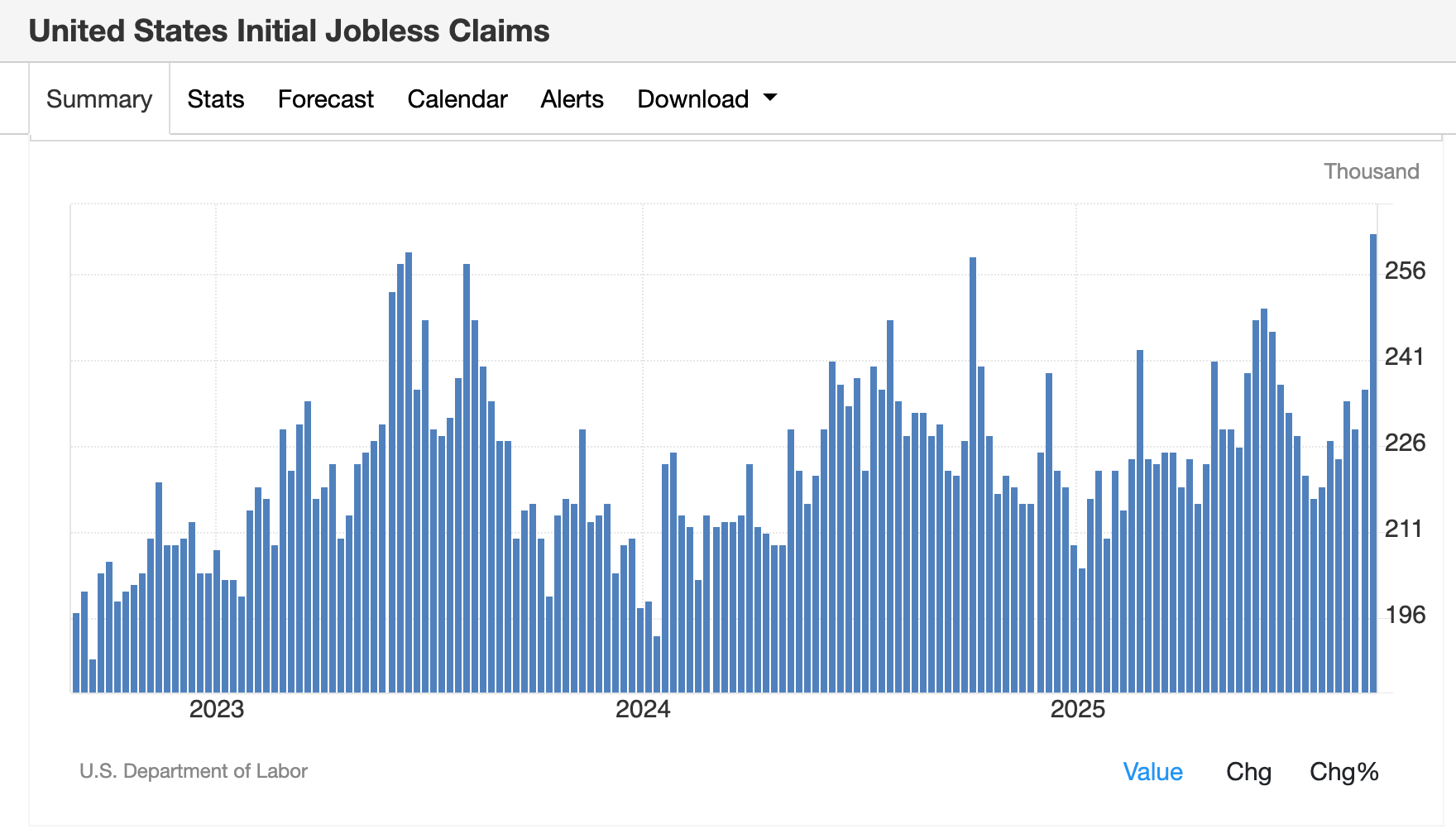
Higher inflation and fewer jobs are not great for the U.S. economy, so it’s no surprise that the word «stagflation» is starting to creep back into macroeconomic commentary.
Against this backdrop, bitcoin—considered a risk asset by Wall Street—continued grinding higher, topping $116,000 on Friday and almost closing the CME futures gap at 117,300 from August.
Not a surprise, as traders are also bidding up the biggest risk assets: equities. Just take a look at the S&P 500 index, which closed at a record for the second day on the hope of a rate cut.
So how should traders think about BTC’s price chart?
To this chart enthusiast, price action remains constructive, with higher lows forming from the September bottom of $107,500. The 200-day moving average has climbed to $102,083, while the Short-Term Holder Realized Price — often used as support in bull markets — rose to a record $109,668.
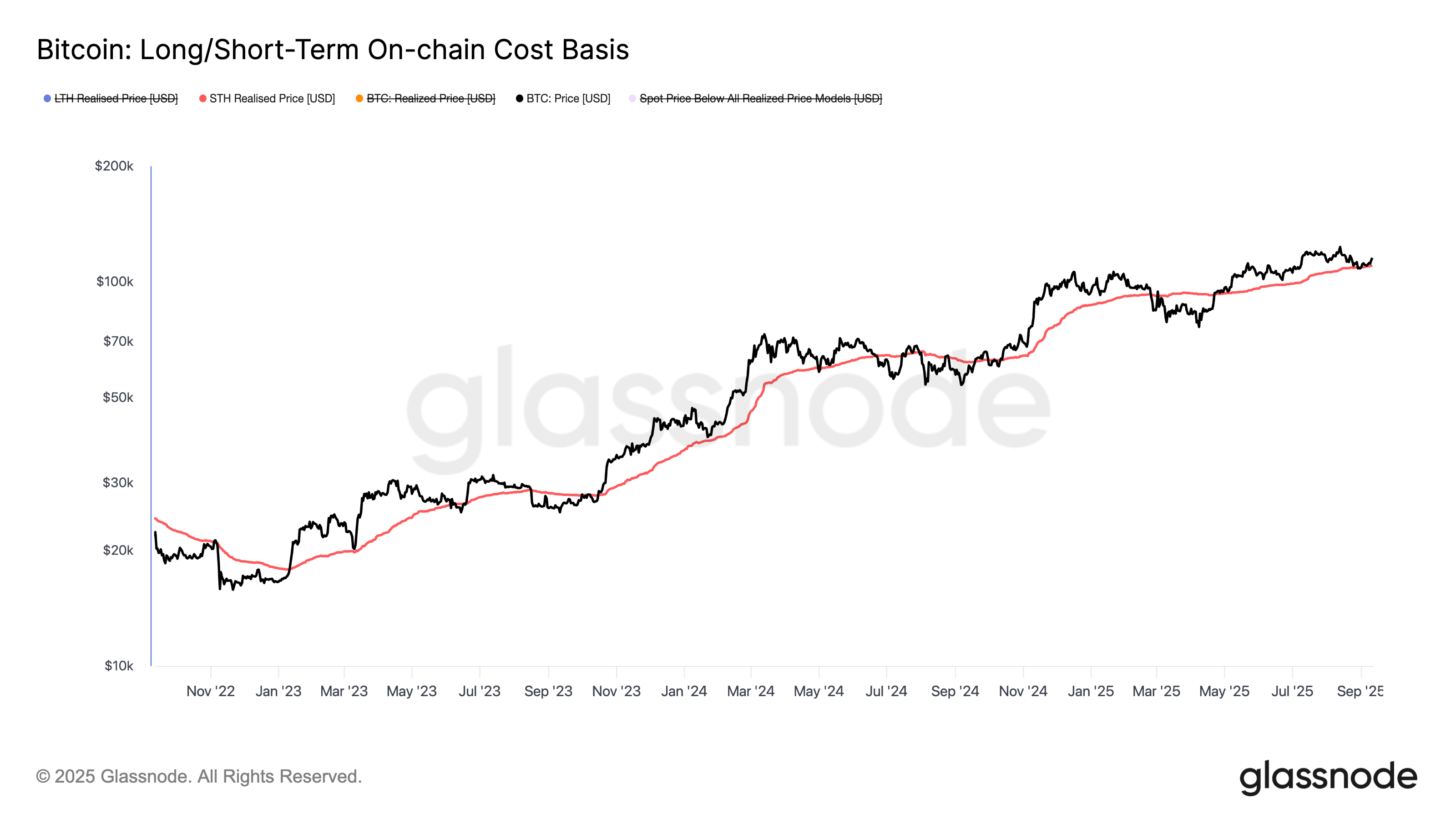
Bitcoin-linked stocks: A mixed bag
However, bitcoin’s weekly positive price action didn’t help Strategy (MSTR), the largest of the bitcoin treasury companies, whose shares were about flat for the week. Its rivals performed better: MARA Holdings (MARA) 7% and XXI (CEP) 4%.
Strategy (MSTR) has underperformed bitcoin year-to-date and continues to hover below its 200-day moving average, currently $355. At Thursday’s close of $326, it’s testing a key long-term support level seen back in September 2024 and April 2025.
The company’s mNAV premium has compressed to below 1.5x when accounting for outstanding convertible debt and preferred stock, or roughly 1.3x based solely on equity value.
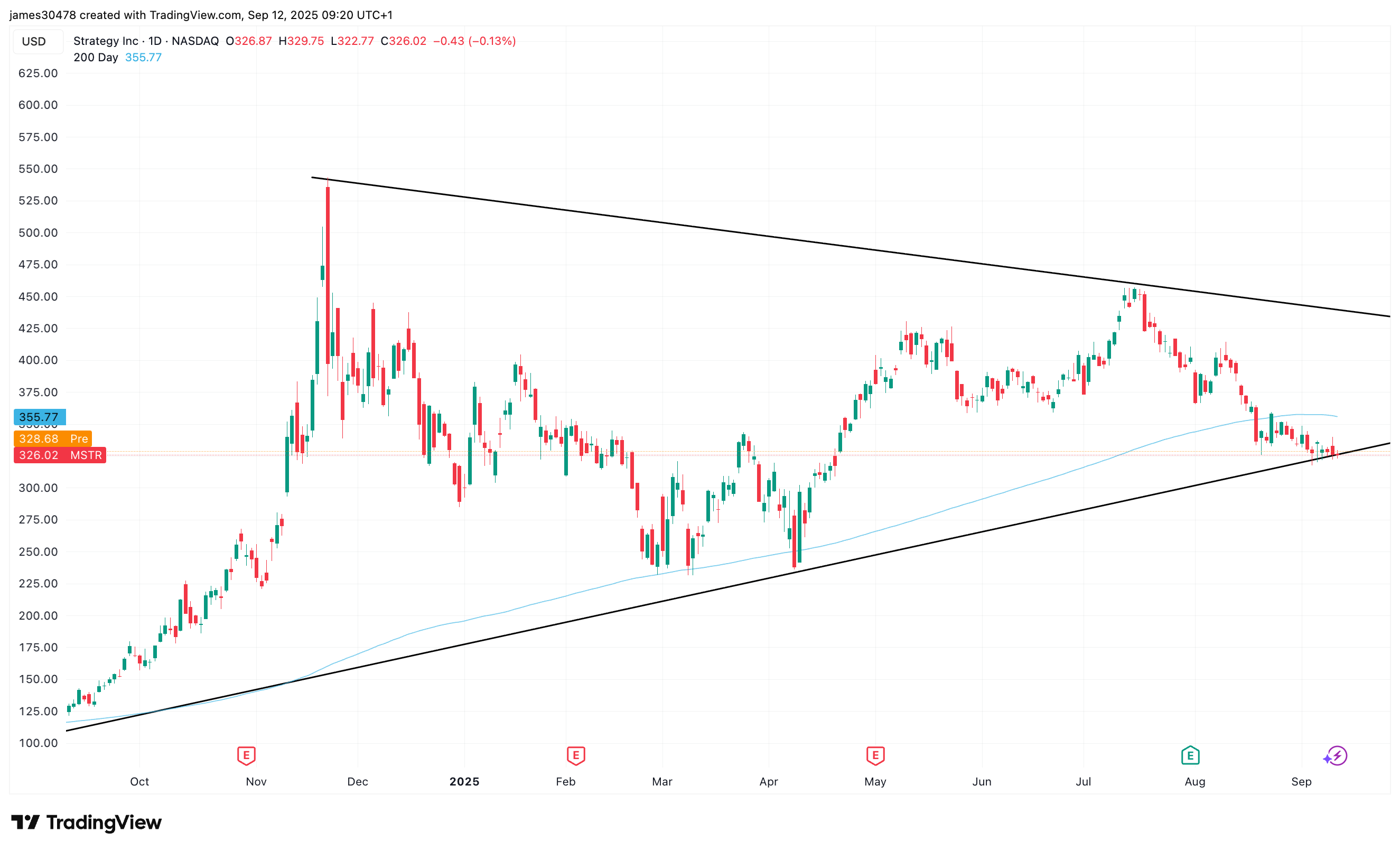
Preferred stock issuance remains muted, with only $17 million tapped across STRK and STRF this week, meaning that the bulk of at-the-money issuance is still flowing through common shares. According to the company, options are now listed and trading for all four perpetual preferred stocks, a development that could provide additional yield on the dividend.
Bullish catalysts for crypto stocks?
The CME’s FedWatch tool shows traders expect a 25 basis-point U.S. interest-rate cut in September and have priced in a total of three rate cuts by year-end.
That’s a sign risk sentiment could tilt back toward growth and crypto-linked equities, underlined by the 10-year U.S. Treasury briefly breaking below 4% this week.
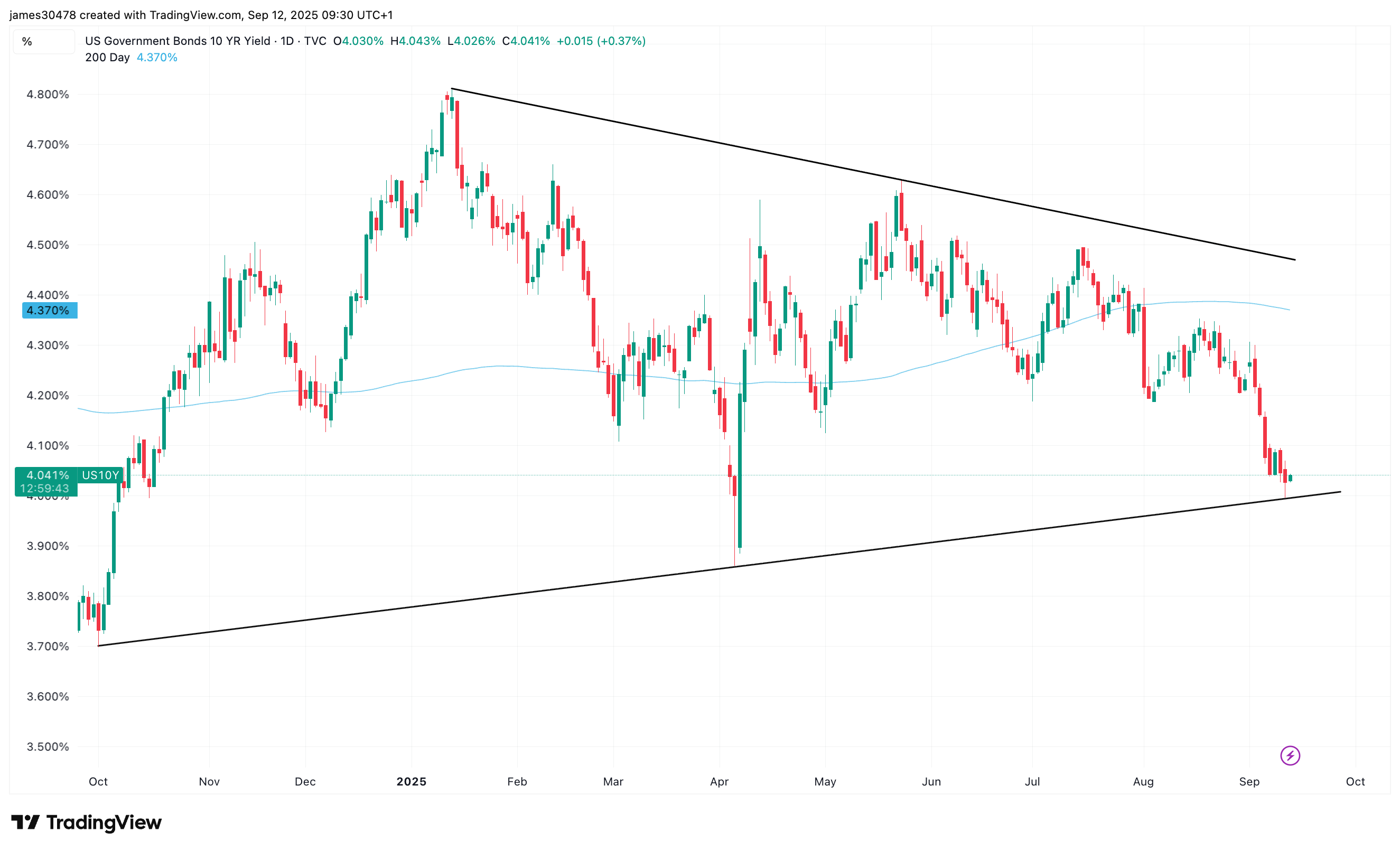
Still, the dollar index (DXY) continues to hold multiyear support, a potential inflection point worth watching.
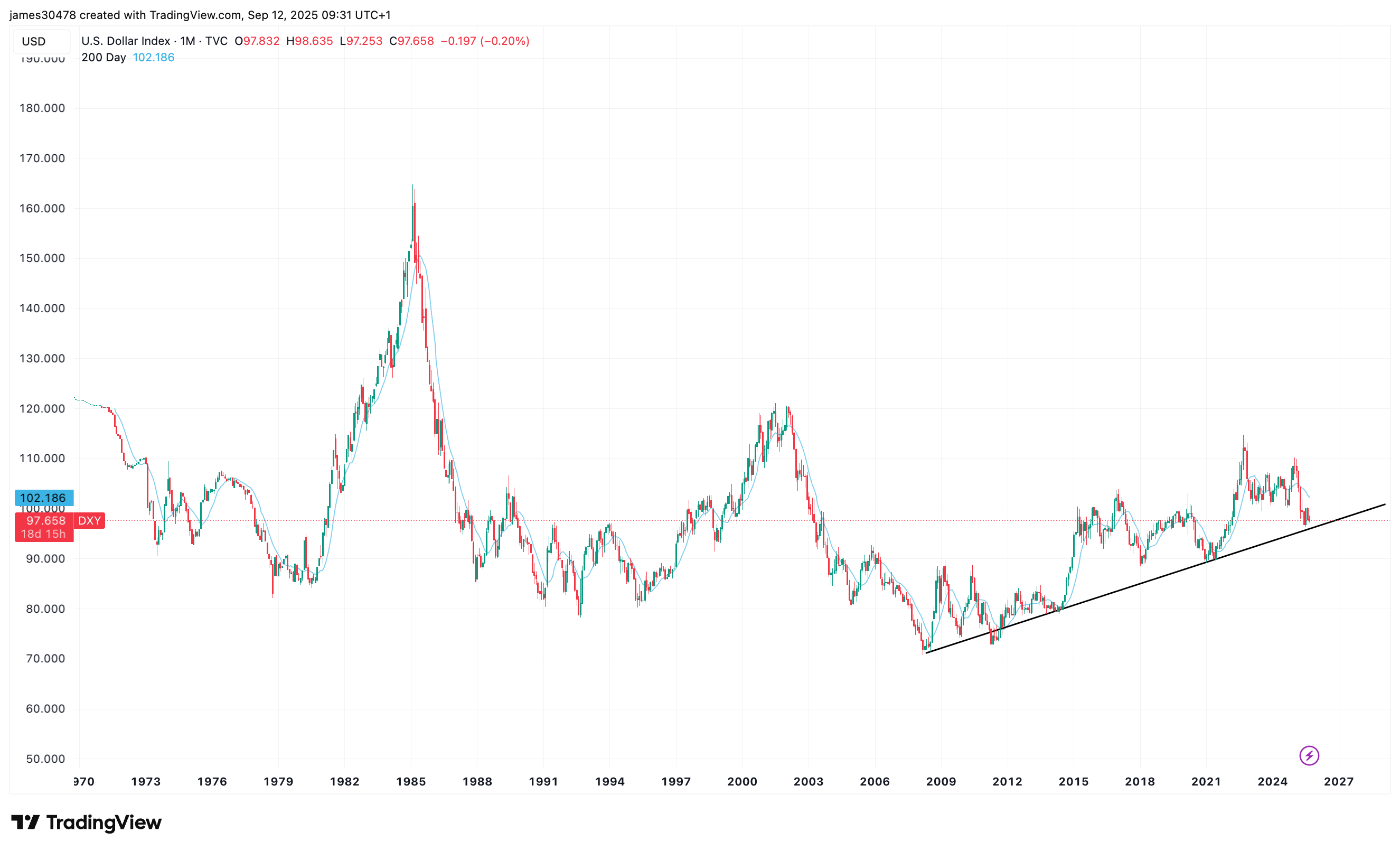
Uncategorized
Fed’s Sept. 17 Rate Cut Could Spark Short-Term Jitters but Supercharge Bitcoin, Gold and Stocks Long Term

Investors are counting down to the Federal Reserve’s Sept. 17 meeting, where markets expect a quarter-point rate cut that could trigger short-term volatility but potentially fuel longer-term gains across risk assets.
The economic backdrop highlights the Fed’s delicate balancing act.
According to the latest CPI report released by the U.S. Bureau of Labor Statistics on Thursday, consumer prices rose 0.4% in August, lifting the annual CPI rate to 2.9% from 2.7% in July, as shelter, food, and gasoline pushed costs higher. Core CPI also climbed 0.3%, extending its steady pace of recent months.
Producer prices told a similar story: per the latest PPI report released on Wednesday, the headline PPI index slipped 0.1% in August but remained 2.6% higher than a year earlier, while core PPI advanced 2.8%, the largest yearly increase since March. Together, the reports underscore stubborn inflationary pressure even as growth slows.
The labor market has softened further.
Nonfarm payrolls increased by just 22,000 in August, with federal government and energy sector job losses offsetting modest gains in health care. Unemployment held at 4.3%, while labor force participation remained stuck at 62.3%.
Revisions showed June and July job growth was weaker than initially reported, reinforcing signs of cooling momentum. Average hourly earnings still rose 3.7% year over year, keeping wage pressures alive.
Bond markets have adjusted accordingly. The 2-year Treasury yield sits at 3.56%, while the 10-year is at 4.07%, leaving the curve modestly inverted. Futures traders see a 93% chance of a 25 basis point cut, according to CME FedWatch.
If the Fed limits its move to just 25 bps, investors may react with a “buy the rumor, sell the news” response, since markets have already priced in relief.
Equities are testing record levels.
Equities are testing record levels. The S&P 500 closed Friday at 6,584 after rising 1.6% for the week, its best since early August. The index’s one-month chart shows a strong rebound from its late-August pullback, underscoring bullish sentiment heading into Fed week.
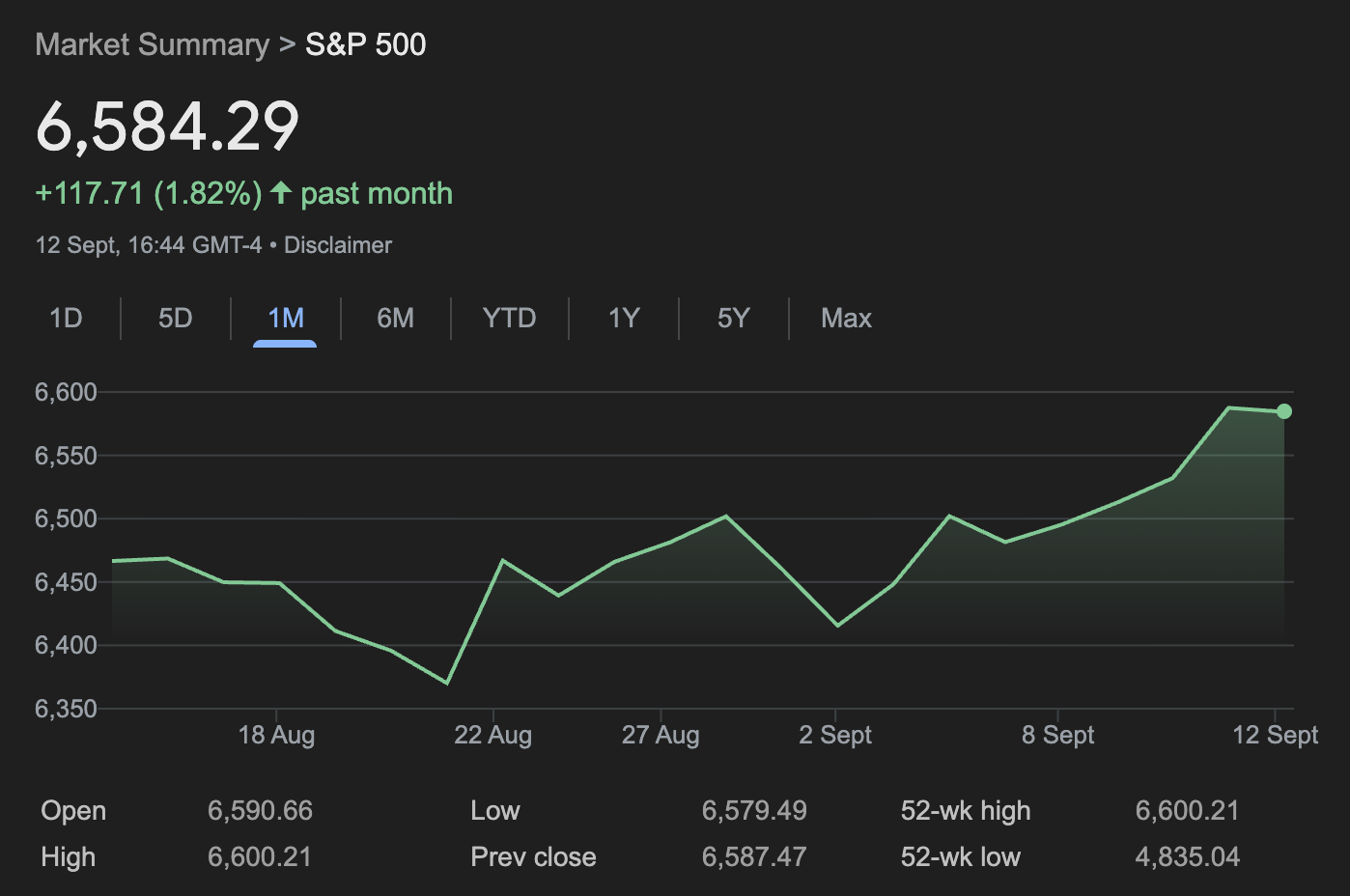
The Nasdaq Composite also notched five straight record highs, ending at 22,141, powered by gains in megacap tech stocks, while the Dow slipped below 46,000 but still booked a weekly advance.
Crypto and commodities have rallied alongside.
Bitcoin is trading at $115,234, below its Aug. 14 all-time high near $124,000 but still firmly higher in 2025, with the global crypto market cap now $4.14 trillion.
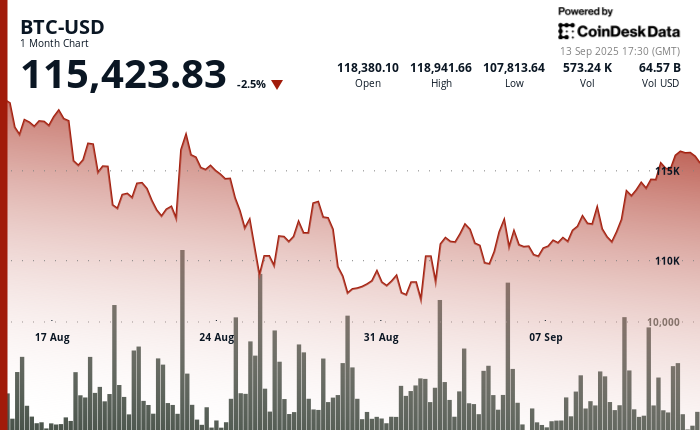
Gold has surged to $3,643 per ounce, near record highs, with its one-month chart showing a steady upward trajectory as investors price in lower real yields and seek inflation hedges.
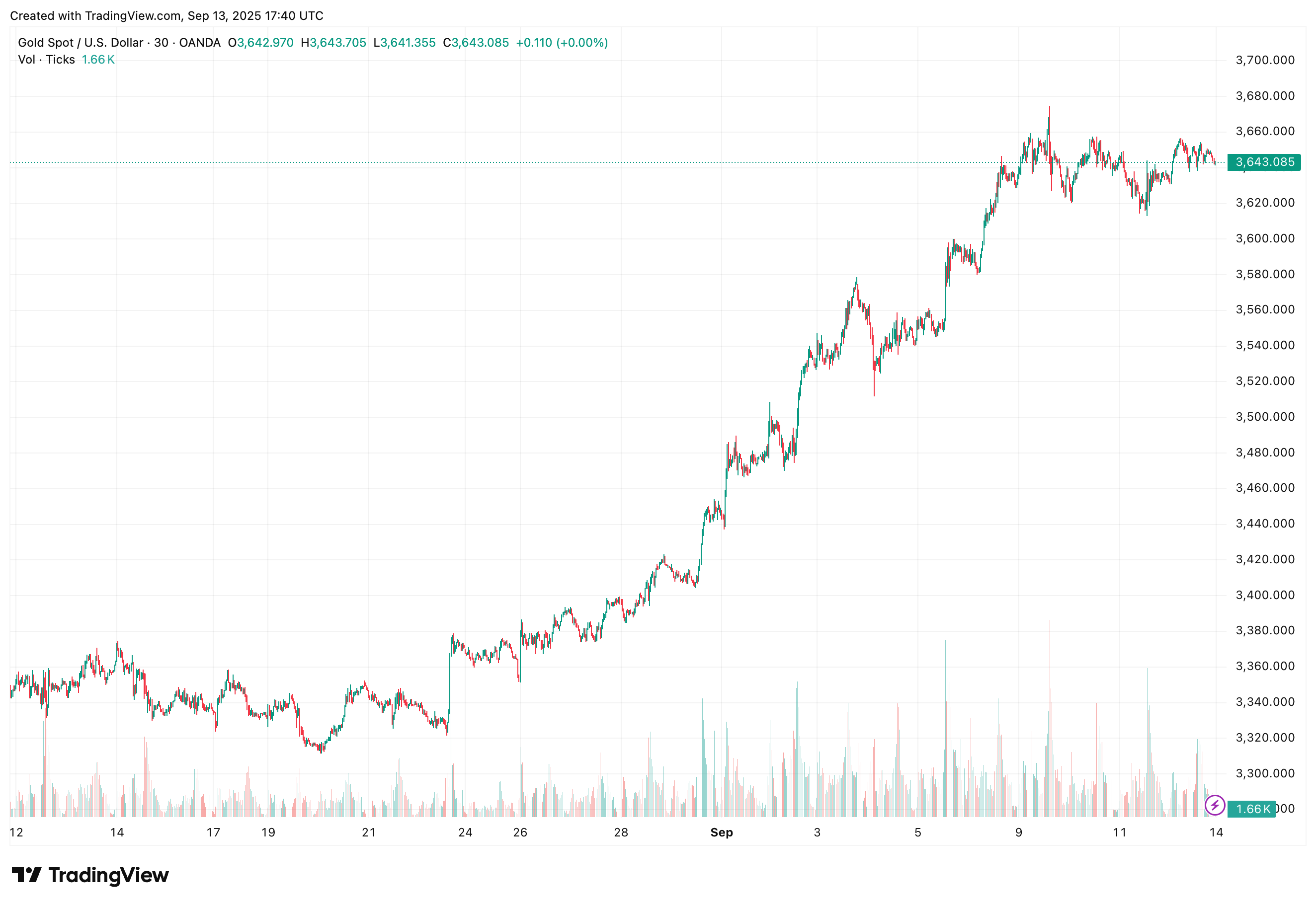
Gold has climbed steadily toward record highs, while bitcoin has consolidated below its August peak, reflecting ongoing demand for alternative stores of value.
Historical precedent supports the cautious optimism.
Analysis from the Kobeissi Letter — reported in an X thread posted Saturday — citing Carson Research, shows that in 20 of 20 prior cases since 1980 where the Fed cut rates within 2% of S&P 500 all-time highs, the index was higher one year later, averaging gains of nearly 14%.
The shorter term is less predictable: in 11 of those 22 instances, stocks fell in the month following the cut. Kobeissi argues this time could follow a similar pattern — initial turbulence followed by longer-term gains as rate relief amplifies the momentum behind assets like equities, bitcoin, and gold.
The broader setup explains why traders are watching the Sept. 17 announcement closely.
Cutting rates while inflation edges higher and stocks hover at records risks denting credibility, yet staying on hold could spook markets that have already priced in easing. Either way, the Fed’s message on growth, inflation, and its policy outlook will likely shape the trajectory of markets for months to come.
-

 Business11 месяцев ago
Business11 месяцев ago3 Ways to make your business presentation more relatable
-

 Fashion11 месяцев ago
Fashion11 месяцев agoAccording to Dior Couture, this taboo fashion accessory is back
-

 Entertainment11 месяцев ago
Entertainment11 месяцев ago10 Artists who retired from music and made a comeback
-

 Entertainment11 месяцев ago
Entertainment11 месяцев ago\’Better Call Saul\’ has been renewed for a fourth season
-

 Entertainment11 месяцев ago
Entertainment11 месяцев agoNew Season 8 Walking Dead trailer flashes forward in time
-

 Business11 месяцев ago
Business11 месяцев ago15 Habits that could be hurting your business relationships
-

 Entertainment11 месяцев ago
Entertainment11 месяцев agoMeet Superman\’s grandfather in new trailer for Krypton
-

 Entertainment11 месяцев ago
Entertainment11 месяцев agoDisney\’s live-action Aladdin finally finds its stars





